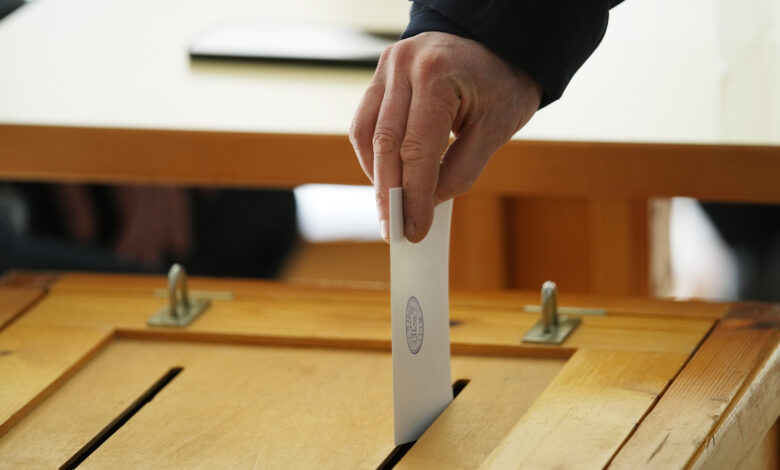Kansas Supreme Court revives lawsuit on law that makes it a felony to impersonate an elections official

TOPEKA, Kan. (AP) — A Kansas law that makes it a felony to impersonate an elections official is vague enough that voting rights advocates can pursue a legal challenge, the state’s highest court ruled Friday, reviving a lawsuit that a lower court dismissed.
The Kansas Supreme Court’s decision came in a challenge to a 2021 law that critics say hinders voter registration drives. Four groups argued in the lawsuit that their members could be prosecuted even if they were clear that they were not election officials but others still mistakenly believed they were. Backers of the law have scoffed at that argument.
The groups are pursuing another lawsuit against other elections restrictions that the Republican-led Legislature passed in 2021 over Democratic Gov. Laura Kelly’s veto amid false claims by some in the GOP that the 2020 presidential election wasn’t valid. One of the groups, Loud Light, said the law at issue in Friday’s ruling led it to stop registering voters even though it registered 10,000 in 2020.
“For two and a half years, the state and the attorney general’s office have said we’re just making this up — we’re crazy,” said Davis Hammet, Loud Light’s executive director. “Here is the Supreme Court of the state saying, ‘Yeah, you should be scared.’”
But Kansas Attorney General Kris Kobach, a Republican, called Friday’s ruling merely “jurisdictional.”
Justice Caleb Stegall expressed skepticism in the court’s opinion that the voting rights groups’ members would be prosecuted for impersonating elections officials. But he said they still have reason to expect their registration drives to generate “innocent or unreasonable listener mistakes.”
“The statute simply does not provide clarity that truthful speech which generates an innocent or unreasonable listener mistake is outside of its scope,” wrote Stegall, who is seen as the seven-member court’s most conservative member.
After reviving the group’s lawsuit over the law against impersonating election officials, the Supreme Court followed up with another order saying that it intends to consolidate that case with the other lawsuit from the four groups.
A three-judge Kansas Court of Appeals panel last year ruled that the groups didn’t have the legal right to challenge the anti-impersonation law because their members had not been prosecuted under it.
Although people and groups generally must show they have been injured to pursue a lawsuit, the state Supreme Court said that when a law is challenged as too vague, it is enough that it could cause someone to avoid constitutionally protected speech.
The law at issue in Friday’s ruling prohibits “conduct that gives the appearance of being an election official” or conduct that causes someone else to believe they are. A first-time offender could be sentenced to 13 months in prison, though the typical sentence would be two years of probation.
Stegall wrote that the law did not provide “a high degree of specificity and clarity” to ensure that only fraud was covered.
In the other lawsuit, a Court of Appeals panel reviewed two different laws. One prohibits people from delivering more than 10 absentee ballots from other voters to elections officials. The other changed the rules for matching a voter’s signature on an absentee ballot envelope with a signature already on file.
The appeals panel for the second lawsuit had different judges. It concluded that voting is a fundamental right and that restrictions cannot stand unless they are written narrowly and address an existing and compelling issue. If the state Supreme Court agrees, voting rights advocates will likely have an easier time challenging rules set by Republican lawmakers.
The state Supreme Court heard arguments from attorneys in the second lawsuit in November and has not said when it will rule.
“The vast majority of our election rules would come under fire,” Kobach told reporters after those arguments. “And many of them would probably fall.”
Republican legislators argued that they were trying to prevent fraud such as “ballot harvesting” and to keep ballots from being lost, though there has been no evidence of either being a significant problem.
Critics of the two laws contend that they handcuff efforts to help poor, elderly and disabled voters and make it more likely that some valid ballots will be rejected.
In November, Elizabeth Frost, an attorney for the four groups, told the state Supreme Court that most Kansas election laws still would pass a strict test “just fine.”
But the justices appeared to struggle to balance their concerns about legal votes not being counted with potentially jeopardizing long-standing rules, including limits on when polls are open.
Justice Eric Rosen, who was appointed by a Democratic governor, said from the bench, “How does that line get drawn?”



